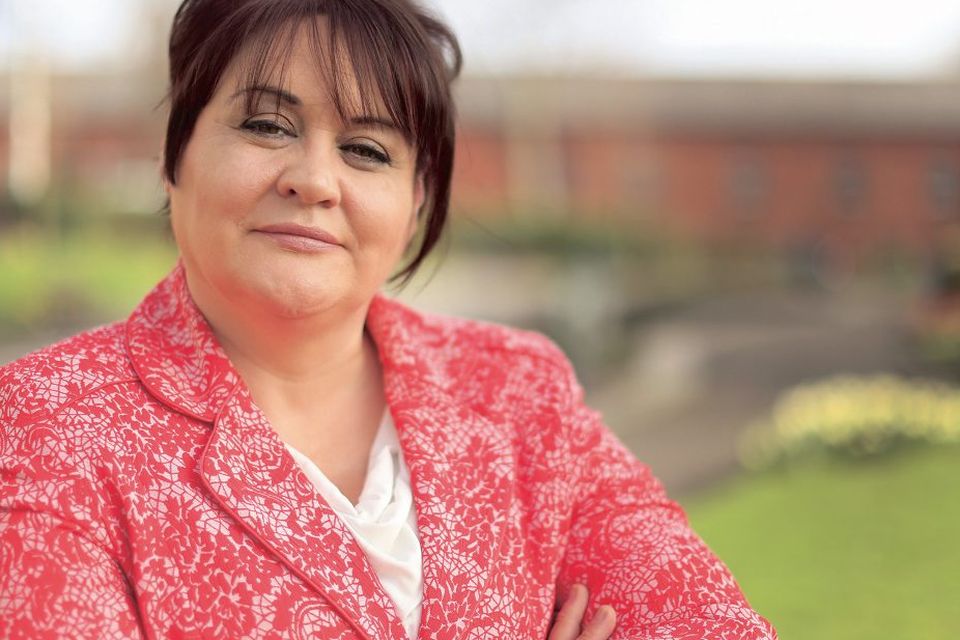A constant battle... for services to fith lymphoedema
Suffering from lymphoedema is tough enough, according to Susan Carry. But she says having to fight tooth and nail for services to deal with the problem doesn't make sense, economically or practically
Susan Carry, financial manager with LMC Energy Solutions. Photo: Gerry Mooney
During a three-year period in the late 1990s, Susan Carry (45) who grew up in Kells, Co Meath, lost her sister, her mother and her father to cancer. Later she also lost two more siblings.
It all began in 1996. "My sister Breda, who was also my best friend, was diagnosed with a liver tumour," says Susan. "She died seven months later, when she was just 30. It was terribly, terribly sad."
Not long after, her mother and then her father succumbed to different forms of cancer. Susan believes the shock of their daughter's untimely death hastened their passing. And if losing three close family members wasn't bad enough, Susan then had to deal with the difficulties of a failed marriage. At the time, her three children were all under the age of seven. So she entered the world of accounting and is now a financial manager with LMC Energy Solutions.
In October 2006, Susan was diagnosed with cervical cancer. She had a radical hysterectomy - her uterus was removed as well as the surrounding tissue, the cervix, lymph nodes and ovaries. This was followed by chemotherapy, radiotherapy and brachytherapy (high doses of radiation directed internally to specific cancer sites).
A couple of years later, genetic testing revealed that certain members of the family, particularly on her mother's side, were suffering from hereditary nonpolyposis colorectal cancer (HNPCC) or Lynch syndrome. This increases the chances of getting cancer, so Susan is regularly checked for the early signs of illness. Nonetheless, she has had to face yet more grief: in 2010 her sister Trisha, who was then 51, died from renal cancer. Three years later, their 49-year-old brother Paul lost his life to colon cancer.
That very same year Susan was diagnosed with a tumour near her spine. "Initially they thought they couldn't operate because it was in an awkward place," she says, "but in the end a wonderful surgeon from St James's Hospital removed it."
Susan has a number of other ongoing medical issues that need attention, and all that combined with her work means she has little free time to herself. Yet she is forced to fight for basic services for a related condition called lymphoedema.
The Irish Cancer Society says the lymphatic system acts like a waste disposal unit, draining fluids and waste products from the body's tissue. But it also plays a valuable role in fighting infection. When the lymphatic system becomes blocked (lymphoedema) - because lymph nodes which filter waste products have been removed or damaged - fluids build up, usually in the limbs, causing swelling and discomfort.
Susan developed lymphoedema following her hysterectomy; this resulted in her legs being severely swollen from toes to hips, a situation which persists to this day.
Treatment involves a gentle form of massage to get the fluid moving and out of the body. Extensive bandaging (immediately following massage) and compression garments worn on a daily basis assist with this process. "It's not nice at the age of 37 to be told you will be wearing compression garments all day, every day, for the rest of your life," says Susan. "Or that you will never be able to wear dresses or shorts, or stilettos because you just can't get your feet into them. That's all really hard for your self-esteem."
Susan says it's difficult for public patients in Ireland to access regular massage. Consequently she has gone to Germany twice, as part of the Treatment Abroad Scheme, spending five weeks having lymphatic drainage. "The massage is done in conjunction with exercise, diet and skin care," explains Susan. "Overall I lost eight litres of fluid and that made a huge difference to my quality of life."
However, when she returned home, there wasn't sufficient follow-up maintenance, so she soon reverted to being swollen again. "That's a terrible waste," she comments. Two recent applications to have further treatment in Germany have been denied, on the grounds that treatment was available here. "But it's not sufficient to meet my needs," Susan says.
To make matters even worse, people who have lymphoedema are - because their immune system is lowered - more prone to cellulitis, a serious skin condition. "When you get cellulitis," explains Susan, "you get a high temperature, a scaldy rash that spreads quickly and makes you feel very sick, so it's straight to A&E where they put you on IV antibiotics as an in-patient for about 10 days."
She says that apart from her full-time job, she is in and out of hospital all the time just trying to stay on top of her gynaecological problems and the risks she faces because of the Lynch syndrome. As a result, fighting for basic treatment for her lymphoedema - and the resulting cellulitis - is "just exhausting". However, Susan is extremely grateful to her employers, who allow her time for her hospital visits.
"As more people survive cancer, so more people develop lymphoedema, but where are the services for them?" she asks. "The National Health Service (NHS) in the UK did a survey and found that for every £1 they spend on lymphoedema services, they save £100. The patients are not getting as many infections, so they don't need to be treated in hospital as often, and, of course, they are better able to work and not be a drain on the State."
Susan recounts a personal experience: "I asked the HSE for compression stockings as mine were worn out. They said they didn't know when I could get them. So in desperation I applied to go to Germany on the Treatment Abroad Scheme. I flew out on the Monday, went to be measured at the clinic on Tuesday and flew home on Wednesday. The stockings arrived at my house on the Friday. The HSE paid for the flights, the clinic visit and the stockings; they really do need to look at the bigger picture."
Susan says even though the HSE did a review of lymphoedema services in 2013, the findings have still not been published. "As a patient I deserve to see those results," she says.
A spokesman for the Government's National Cancer Control Programme said "a comprehensive booklet is to be disseminated across appropriate health locations. This acts as a useful support for patients who are at risk of lymphoedema or who already have lymphoedema."
For more information contact the Irish Cancer Society. Tel, (1800) 200-700, or see cancer.ie
Join the Irish Independent WhatsApp channel
Stay up to date with all the latest news















